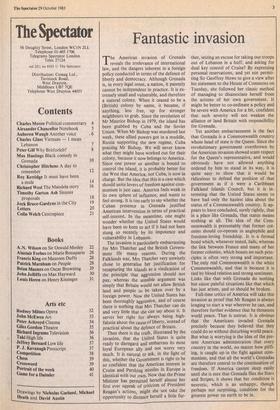Fantastic invasion
The American invasion of Grenada reveals the irrelevance of international law, and the dangers inherent in a foreign policy conducted in terms of the defence of liberty and democracy. Although Grenada is, in every legal sense, a nation, it patently cannot be independent in practice. It is ex- tremely small and vulnerable, and therefore a natural colony. When it ceased to be a (British) colony by name, it became, if 'anything, less free, up for stronger neighbours to grab. Since the revolution of Mr Maurice Bishop in 1979, the island has been grabbed by Cuba and the Soviet Union. When Mr Bishop was murdered last week, these allied powers got in a muddle, Russia supporting the new regime, Cuba praising Mr Bishop. We will never know what they might have worked out for their colony, because it now belongs to America. Since one power or another is bound to control the island, it is probably better for the West that America, not Cuba, is now in charge. But the idea that this is a case which should unite lovers of freedom against corn- munism is just cant. America feels weak in its own sphere of influence, and wants to feel strong. It is too early to say whether the Cuban presence in Grenada justified American intervention in terms of practical self-interest. In the meantime, one might wonder whether the United States would have been so keen to act if it had not been stung so recently by its impotence and vulnerability in Lebanon.
The invasion is particularly embarrassing for Mrs Thatcher and the British Govern- ment for many reasons. During the Falklands war, Mrs Thatcher very unwisely chose to generalise her justification for recapturing the islands as a vindication of the principle that aggression should not pay, whereas the sensible argument was simply that Britain would not allow British land and people to be taken over by a foreign power. Now the United States has been thoroughly aggressive, and of course there is nothing that Mrs Thatcher can do and very little that she can say about it. It serves her right for always being high- falutin about the cause of liberty, instead of practical about the defence of Britain. Then there is the truth, illustrated by the invasion, that the United States is quite ready to disregard and embarrass its most loyal European ally and not worry very much, It is natural to ask, in the light of this, whether the Government is right to be so confident that the American interest in Cruise and Pershing missiles in Europe is identical with our own. Now that the Prime Minister has permitted herself almost her first ever squeak of criticism of President Reagan's actions, might she not take the opportunity to distance herself a little fur-
ther, seizing an excuse for taking our troops out of Lebanon in a huff, and asking for dual key control of Cruise? By expressing personal reservations, and yet not permit- ting Sir Geoffrey Howe to give a view after his statement to the House of Commons on Tuesday, she followed her classic method of managing to disassociate herself from the actions of her own government. It might be better to co-ordinate a policy and be severe with America for a bit, confident. that such severity will not weaken the alliance or land Britain with responsibility for Grenada.
Yet another embarrassment is the fact that Grenada is a Commonwealth country whose head of state is the Queen. Since the revolutionary government overthrown by the American invasion showed scant respect for the Queen's representative, and would obviously have not allowed anything ordered by him to stand in its way, it is quite easy to show that it would be ridiculous to defend the position of that government as if it were a Caribbean Falkland Islands Council, but it is in- teresting that the United States seems to have had only the haziest idea about the status of a Commonwealth country. It ap- pears to have concluded, surely rightly, that in a place like Grenada, that status means nothing at all. The idea of the Com- monwealth is presumably that former col- onies should co-operate in anglophile and freedom-loving friendship. It is a formal' bond which, whenever tested, fails, whereas the link between France and many of her former colonies, which boasts no such prin- ciples is often very strong and important. The, only real Commonwealth is the white Commonwealth, and that is because it is tied by blood relation and strong sentiment. Links like that with Grenada do nothing but cause painful situations like that which has just arisen, and so should be broken.
Full-time critics of America will take this invasion as proof that Mr Reagan is always longing to start a war wherever he can, and therefore further evidence that he threatens world peace. That is untrue. It is obvious that the Americans invaded Grenada precisely because they believed that they could do so without disturbing world peace. But what is worrying is the idea of the pre- sent American administration that every country in the world, no matter how piffl- ing, is caught up in the fight against com- munism, and that all the world's Grenadas are therefore central to the continuation of freedom. If America cannot sleep easily until she is sure that Grenada flies the Stars and Stripes, it shows that her condition is neurotic, which is an unhappy, though perhaps not surprising, condition for the greatest power on earth to be in.














































 Previous page
Previous page